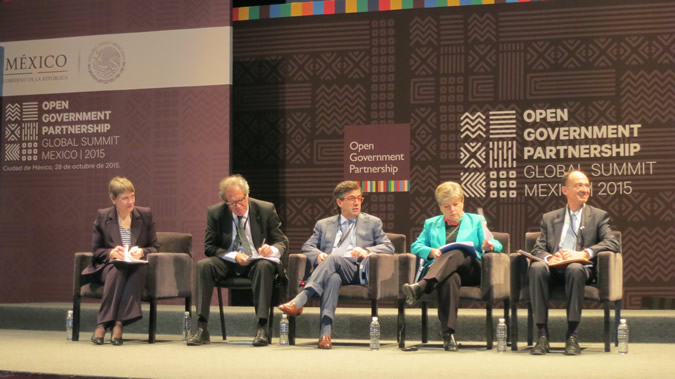Alicia Bárcena Advocates Open States to Promote the 2030 Agenda
Work area(s)
ECLAC’s Executive Secretary is participating in the Open Government Partnership Global Summit being held from October 27-29 in Mexico.

Participating today in the Open Government Partnership Global Summit in Mexico, the Executive Secretary of the Economic Commission for Latin America and the Caribbean (ECLAC), Alicia Bárcena, advocated advancing towards the concept of an open State to promote, in conjunction with a more empowered civil society, the implementation of the 2030 Agenda for Sustainable Development.
“More than open governments, we need open States, because access to information is not enough if there is no access to justice or full participation,” Bárcena said while speaking on a panel about the Open Government Partnership’s role in the 2030 Agenda and its Sustainable Development Goals (SDGs), which were approved in September by the United Nations’ 193 Member States.
Other speakers on the panel—which was moderated by Manish Bapna, Executive Vice President of the World Resources Institute—included Helen Clark, Administrator of the United Nations Development Programme (UNDP); Luis Almagro, Secretary General of the Organization of American States (OAS); Luis Alberto Moreno, President of the Inter-American Development Bank (IDB); and Jan Walliser, Vice President for the World Bank’s Global Practices for Equitable Growth, Finance and Institutions.
Alicia Bárcena explained that the concept of an open State involves the three branches of government: executive, legislative and judicial. “A new equation between the State, the market and society is also needed, in which the citizenry is empowered and the State protects the full exercise of their rights,” the Executive Secretary stated, referring to the sentiment of civil society reflected in the phrase: “Nothing about us without us.”
With the SDGs as a guide, Bárcena added that Latin America and the Caribbean should move from an economic model based on the extraction of natural resources to another one based on sustainability, and from a culture of privilege to a culture of equality. She also underscored that in that sense the concept of open government constitutes a mechanism for implementing the entire 2030 Agenda.
In addition, the Executive Secretary indicated that ECLAC contributes to the data revolution through the production of both statistics and empirical information as well as methodologies to analyze these figures. In this sphere, she recalled that the United Nations regional organization holds the technical secretariat of the Statistical Conference of the Americas, a subsidiary body of ECLAC.
The senior United Nations official also reminded listeners that ECLAC carries out numerous initiatives to promote open government policies in Latin America and the Caribbean through technical assistance and the publication of studies, as well as training activities, which include collaboration with the OAS on a programme regarding this subject.
Alicia Bárcena, who attended the inauguration of the Summit by Mexican President Enrique Peña Nieto, will also participate in another two panel discussions about the Data Revolution for Sustainable Development, also on October 28, and about Disclosing Natural Resource Data to Advance Governance, on October 29.
The Open Government Partnership (OGP) is a voluntary multilateral initiative that was launched in September 2011, during the sixty-sixth session of the United Nations General Assembly. There are currently 66 countries participating in it, 15 of them from Latin America and the Caribbean: Argentina, Brazil, Chile, Colombia, Costa Rica, the Dominican Republic, El Salvador, Guatemala, Honduras, Mexico, Panama, Paraguay, Peru, Trinidad and Tobago and Uruguay.
Country(ies)
- Latin America and the Caribbean